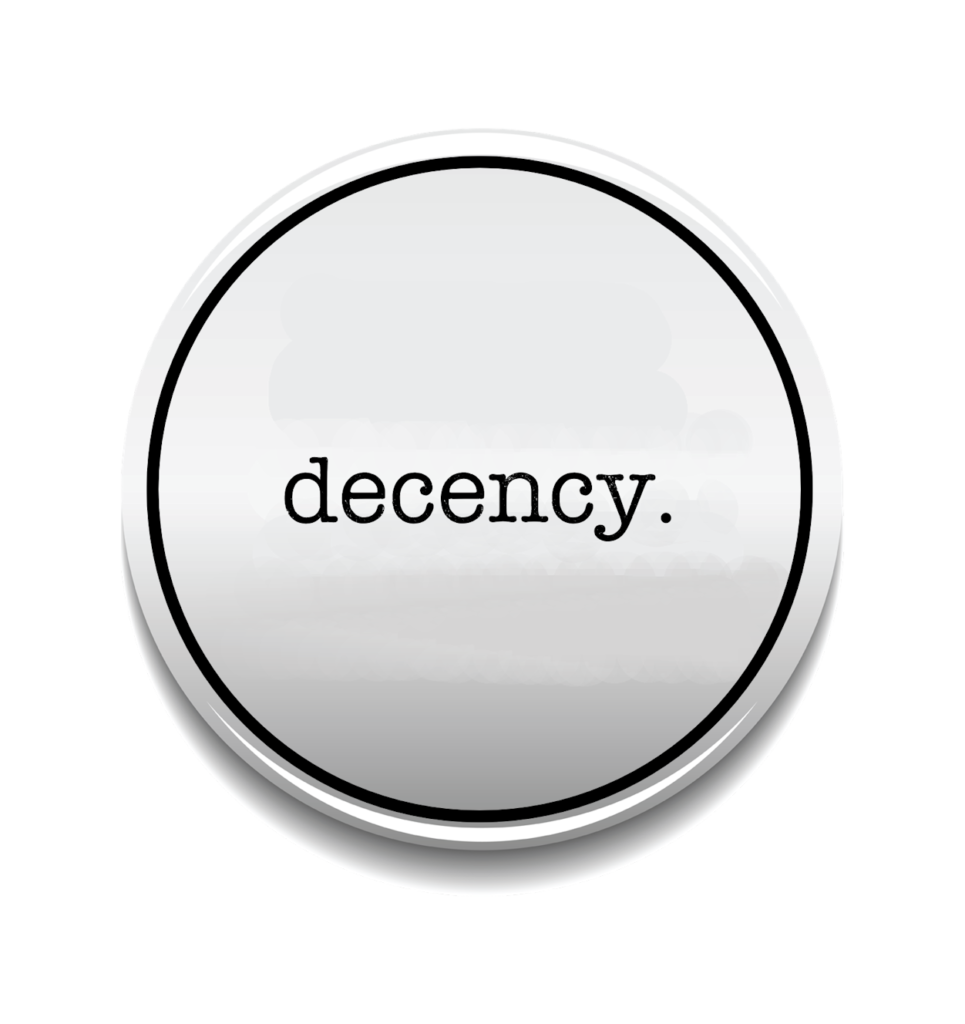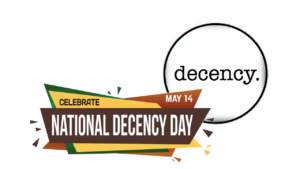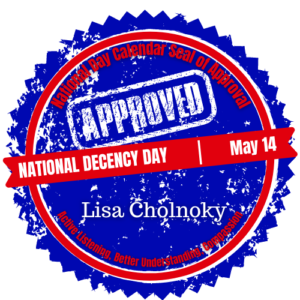You can find a “national day” for just about any topic; however, few topics need or deserve as much attention as decency and civility. Over the weekend, you probably missed celebrating National Decency Day (May 14). According to the website nationaldaycalendar.com, “National Decency Day celebrates the basic standard of civility that every American deserves. Decency is a non-partisan grassroots movement launched to inspire decency in everyday life — in both conversations and actions. By raising awareness, the movement aims to encourage schools and local community groups to embrace decency and integrate it into both curriculum plans and service projects.”[1] According to the website, National Decency Day is the brainchild of Lisa Cholnoky (@LisaCholnoky), a New York City-based parent and graphic designer.
The website notes Cholnoky was determined to make a difference by trying to address the “divisive public discourse around her, as well as in the news and on social media.” Her first modest effort, in 2017, was to design a “decency button,” which she wore every day. “The impact was immediate; the message contagious.” In July of that year, she mailed a decency button to every member of the U.S. House of Representatives and U.S. Senate. In September, her movement was recognized on the floor of House and Representatives and members were encouraged “to reach across the aisle with civility and serve as role models for us all.” Obviously, the message was lost on a number of them. Undeterred, Cholnoky established National Decency Day in 2019.
Decency and Civility
Author Gregory McNamee writes, “We live in bitter, angry times, with a hall-of-funhouse-mirrors quality to them. … In this swirl of flying invective and free-floating rage, we’re barely talking to one another except to shout. All this speaks to a crisis of civility.”[2] The late religious leader Gordon B. Hinckley wrote, “Civility carries with it the essence of courtesy, politeness, and consideration of others. All of the education and accomplishments in the world will not count for much unless they are accompanied by marks of gentility, of respect for others, of going the extra mile.”[3] Today, especially in the political arena, decency and civility are hard to find. In fact, many politicians make it a point to be deliberately uncivil. McNamee believes that civility and decency are traveling companions. Of the two, however, decency is more important than civility. He explains:
“One can have heart and mind full of venom and still be civil; decency need not enter the picture. Like civility, the latter term speaks to propriety of conduct. Unlike civility, it carries an element of essential soulcraft to it: It goes deeper, into character more than manners. A civil person may be a scoundrel, a decent person never so; a civil person may be a racist, a decent person not; and so forth. Decency gauges the inherent rightness or wrongness of a thought or action, while civility is largely agnostic on such matters. When Joseph Nye Welch beseeched Joseph McCarthy, in a famous moment in American political history, ‘At long last, have you left no sense of decency?’ he was asking the Wisconsin senator for more than showing a little decorum.”
Michael Dowling (@MichaelJDowling), president and CEO of Northwell Health, argues that both civility and decency are required in today’s world. He writes, “Considering the political, racial and ethnic divides we’re experiencing as a nation, what’s most needed now is a pledge by all of us to treat each other with civility and decency.”[4] He adds, “Even before Covid-19 upended our society in early 2020, the decline of civility and decency was taking its toll on the public psyche, with our elected leaders relentlessly sniping at each other and rudeness, arrogance and rage on display in all facets of daily life — on our highways, on TV, in the workplace and, of course, on the internet. … What’s particularly troubling today is the commonality and acceptance of incivility. Many of our nation’s elected leaders, including members of Congress, are setting the tone for bad behavior, making it more acceptable for others in society to follow suit, creating a noxious environment lacking any boundaries of decency.”
Steps We Can Take
The nationaldaycalendar.com website lists the ABCs of decency. “Decency is all about: Active listening; Better understanding; [and] Compassion.” Dowling builds upon those thoughts.
Active Listening. Dowling encourages us to listen, even when we disagree with what others are saying. He explains, “At their core, civility and decency are about respecting other people’s opinions, regardless of how extreme they may be or how strongly we disagree with them. Rather than criticizing them or launching into a debate, listen to what others have to say and ask questions. Explain your own point of view and perspective in a reasonable, thoughtful way, without insisting you are right. … Face-to-face dialogues in nonconfrontational settings tend to be far less acrimonious than anonymous, unrestrained social media posts.”
Better Understanding. Understanding can never enter a closed mind. Understanding also doesn’t mean accepting or agreeing with someone’s opinions and ideas. If you want someone to understand you better, Dowling suggests you should choose your words carefully. He writes, “Be aware of what you say and how you say it. Again, don’t ridicule. Recognize that tensions run high on hot-button topics and people might hold strong views that differ from your own. Certainly feel free to share your opinions, but do so in a respectful manner.”
Compassion. Coming from the healthcare field, Dowling is particularly sensitive to how important compassion can be. He writes, “Show empathy. … We need to carry that into our day-to-day interactions with people in all walks of life. All of us will deal with personal or professional difficulties at some point in our lives, which could contribute to the strong viewpoints people hold. Always be willing to lend a sympathetic ear when speaking to those who may be struggling. Show that you care, offer reassurances and perhaps suggestions you think may help address their problems.”
Concluding Thoughts
A few years ago, Kirk E. Francis Sr., the Penobscot Indian Nation Chief, wrote, “I fear that too many are becoming desensitized and are normalizing these events and actions that we know in our hearts run counter to our childhood teachings of right versus wrong. The political discourse in this country has moved beyond political differences of opinion and is unlike any we have seen in recent history. It has exposed a truth about who we are; that there are fundamentally different views across this country about human dignity and respect, morals, values, ethics, and justice which serve to weaken us as a society. The sad truth is that America is suffering, and she has lost her way. If we continue down the current path, the damage caused by the deconstruction of our founding principles, and the values that we profess to be the basis of our exceptionalism, may be too insurmountable to overcome.”[5]
Rather than be discouraged, Francis notes, “We have the power to do better as a collective society should we choose not to normalize discord; should we choose common decency over politics; should we find the courage to lead with empathy, compassion, and love; should we find the strength to exemplify our convictions in our daily lives; should we recognize the greater law of universal justice and righteousness; and should we decide to recognize that we are all children of the Creator and that we are all related.” McNamee agrees we can change society, but only if we change ourselves. He concludes, “A decent society is fair and constructive, a civil one merely polite. Given the war on the social contract and the supremacy of the zero-sum game, of course, we should be grateful to take what we can get, but there’s a world to win — with the utmost courtesy, of course.”
Footnotes
[1] Staff, “National Decency Day,” nationaldaycalendar.com.
[2] Gregory McNamee, “Civility vs. Decency,” VQR Online, Fall 2018.
[3] Gordon B. Hinckley, Standing for Something: 10 Neglected Virtues That Will Heal Our Hearts and Homes, Three Rivers Press, 22 February 2000.
[4] Michael Dowling, “A call for civility and decency,” Northwell Health Newsroom, 5 January 2022.
[5] Kirk E. Francis Sr., “Statement on the current crisis of diminishing civility, compassion and decency unfolding in the United States,” 4 July 2018.





